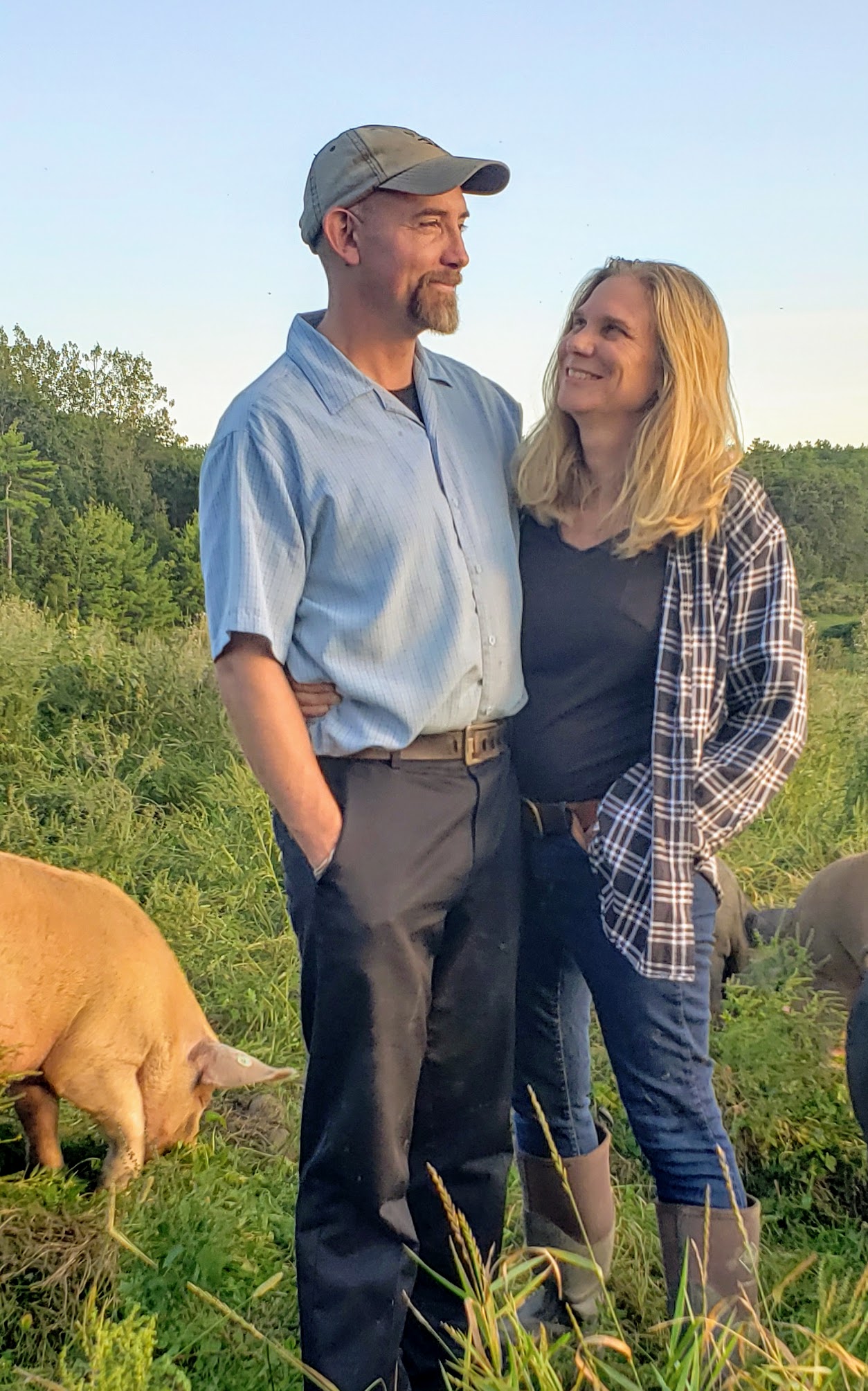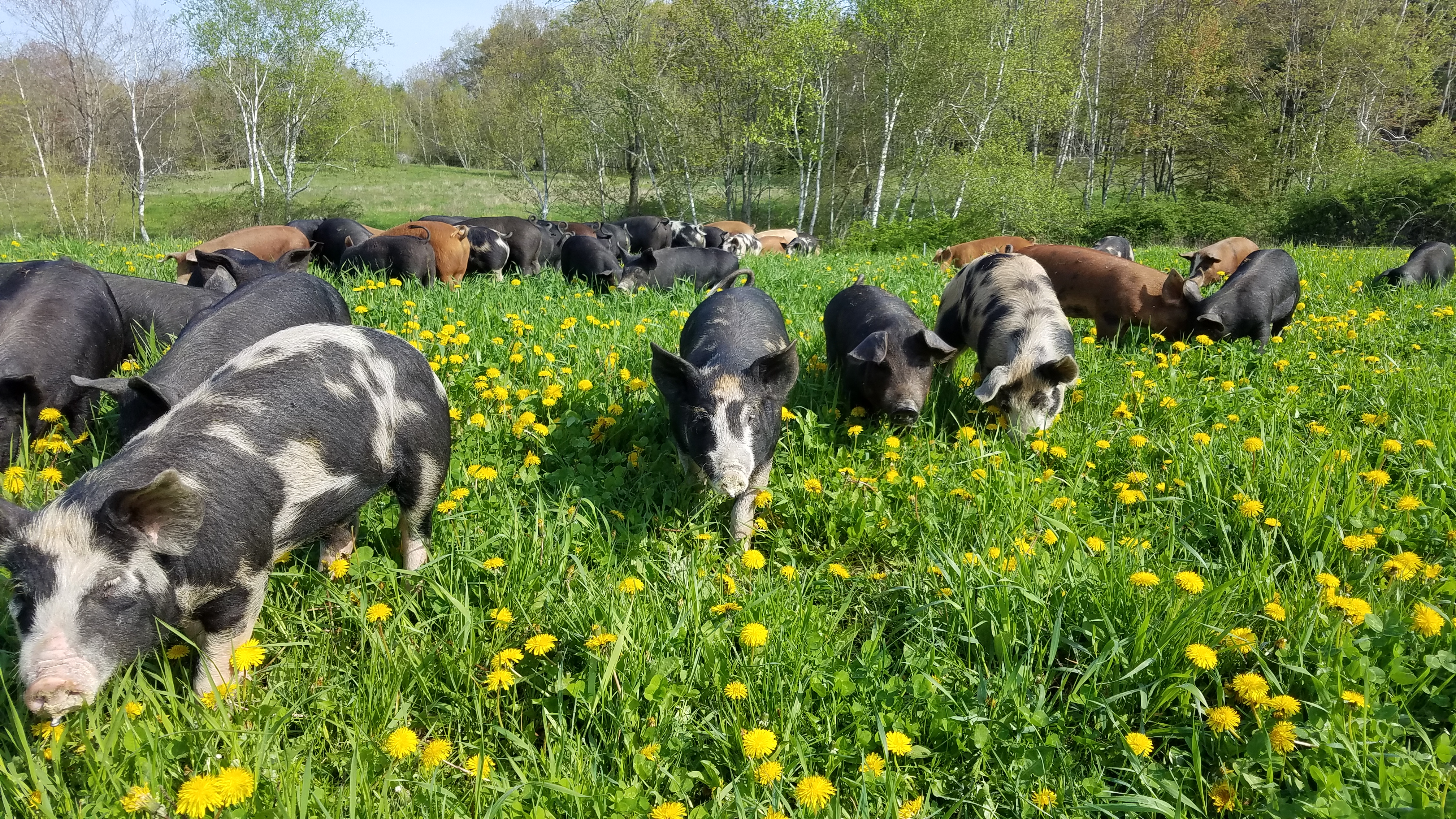Singing Pastures
Singing Pastures, Leading a Regenerative Movement in Maine
Sandra Yerges
 Sometimes one’s passion does not always correlate with the interests of their customers. This was a barrier John and Holly Arbuckle, owners of Singing Pastures, faced when marketing their pork-based products before the Value-Added Producer Grant (VAPG). Their enthusiasm for regenerative farming has familial ties, which makes their work with sustainable agriculture extra important for them.
Sometimes one’s passion does not always correlate with the interests of their customers. This was a barrier John and Holly Arbuckle, owners of Singing Pastures, faced when marketing their pork-based products before the Value-Added Producer Grant (VAPG). Their enthusiasm for regenerative farming has familial ties, which makes their work with sustainable agriculture extra important for them.
John was immersed in agriculture all his life and is a ninth generation family farmer. Growing up, he farmed the same land in the Midwest as his grandfather. During that time, his father received a Parkinson’s disease diagnosis, which heightened John’s interest in regenerative agriculture. As a farmer of corn and soy, he saw the dangers of treating crops with chemicals and hypothesized a correlation with his father’s health concerns. Ever since then, sustainable, chemical-free farming became his mission for his future business.
When Holly and John purchased their first Missouri-based farm in 2010, they focused their attention on pig farming and offering their products at farmer’s markets and restaurants in the area. At this time, they unsuccessfully applied for the VAPG. Once they moved to their current 170-acre property in Maine in 2018, they applied for a second time and were granted $176,000 in August 2020.
This first financial assistance effort went toward the brand’s first value-added product line: Roam Sticks. In a competitive environment of grass-fed beef sticks, the Arbuckles chose to create a product of pasture-raised pork sticks, a product missing from the market. Because this is currently a growing industry, Holly noted, “the supply chains are being built as we speak.”
At first, these products were made solely with pork from the pigs raised at Singing Pastures. However, as time went on, they were able to work with other farms to supply them with pork to use for the growing popularity of their Roam Sticks. Although the Arbuckles operate their farm in Maine, their Roam Sticks are created at their out-of-state co-packer.
To make this product stand out in the new market, John and Holly focused their VAPG funds toward packaging for their Roam Sticks that correlated to their brand in a more professional way. Furthermore, they were able to make their way into more third-party e-commerce platforms, including Thrive Market, Misfits Market, and Imperfect Foods.
While these funds were in place and sales began to grow exponentially, the normal operations of the farm continued. The business carried on with hosting other farm animals on their property that could aid in their regenerative grazing practices. Traditionally, the pigs of Singing Pastures follow in the footsteps of the other farm’s livestock while grazing, which is a great way for the animals to make use of the land.
Although their rotational grazing and chemical-free approach to business is of utmost importance to John and Holly, they found that the customers of their business do not share in the same passion for these regenerative practices. This stems from a lack of knowledge about this type of farming as Holly shared, “something like 11 percent of the population even knows what regenerative agriculture is.”
Knowing this, Holly explained that their marketing has become less about informing the customer about the importance of their holistic practices and more about the quality and taste of their products upfront. Once that message has been established, they work to tell their story about their family and meat sourcing connections. As a result of these ideas coming across, the inevitable messaging of the regenerative practices flows to the customer.
“I kind of see it as a funnel leading into a deeper conversation,” Holly shared. “I feel like it’s important to start with what’s important to the customer first and then lead them to what’s important to me and to the movement.”
Being that their customers proved they enjoyed the launch of their first value-added product, Singing Pastures decided to reapply for the VAPG for their new salami product made with meat as the main ingredient. The product is made in Boston, which is around three hours away from their farm. Just like the Roam Sticks, the pork for this salami product is sourced from the pigs on the Singing Pastures property and will be sourced from other pasture-raised pigs in the region as demand increases.
Because they began working with the grant project in November 2022, the Arbuckles are in the preliminary stages of this current VAPG process. With USDA approval in place and plans to relaunch their salami product in the near future, the farm is hoping to apply their grant funds to everything from professional marking labor and processing costs. Holly expressed that by utilizing more knowledgeable marketers, “we can make better choices and use our money in a more meaningful way.”
As much of their selling occurs online, the farm recognizes the importance of a thoughtfully designed website. Before this second grant opportunity, the website and its design was created by Holly and her nephew. Now that they have access to web designers with the VAPG funds, they are now able to look into ways to adapt their online messaging with the help of a professional in the industry. This change will also allow the new launch of their salami to be a more user-friendly, and sales-driven experience for online shoppers.
The future of this business is focused on how they can expand their offerings to retailers in the New England region. Even though they know getting products on a shelf is a tough task, they are determined to offer their products to those in their area.
In an industry dominated by large corporations, the Arbuckles are happy there are individuals who care to work with smaller, more independent farms. At the Maine USDA office, they have been fortunate to work with their state representative, Ivana Hernandez Clukey, who has been a friendly, helpful resource for them in their VAPG journey. From personally greeting the Arbuckles at their farm to being a responsive resource for them along the way, Ivana has been a large part of the success of the VAPG experience for Singing Pastures.
 “I appreciate it when there are programs that support independent farms as opposed to the really big players,” Holly stated. This support along with the financial assistance of the VAPG has largely impacted the success of Singing Pastures and the trajectory of their business moving forward. As they embark on this second experience with the grant, John and Holly excitedly await for the opportunities to come.
“I appreciate it when there are programs that support independent farms as opposed to the really big players,” Holly stated. This support along with the financial assistance of the VAPG has largely impacted the success of Singing Pastures and the trajectory of their business moving forward. As they embark on this second experience with the grant, John and Holly excitedly await for the opportunities to come.


